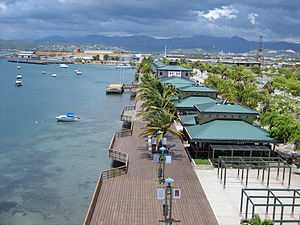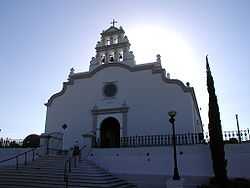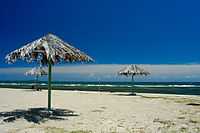Porta Caribe
 | |
 Porta Caribe area shown in red | |
| Motto | Doorway to the Caribbean |
|---|---|
| Formation | May 2009 |
| Type | Government-owned agency |
| Legal status | Statutory |
| Purpose/focus | Tourism & Cultural development |
| Headquarters | Calle Villa #122 |
| Location | Ponce, Puerto Rico |
| Coordinates | 18°00′40″N 66°36′52″W / 18.01106°N 66.61452°W |
| Region served | Southern Puerto Rico |
| Official languages | Spanish, English |
| Director | Nadine de Jesús (incumbent)[1] |
| Key people |
Past directors: Jose A. Reyes Feliciano |
| Parent organization | Puerto Rico Tourism Company |
| Website | www.portacaribe.com |
| Part of a series on |
| Tourism in Puerto Rico |
|---|
| Tourism Regions |
|
| Beaches |
| Caves |
| Cays and islets |
| Convention centers |
|
| Culture |
|
| Islands |
|
Porta Caribe is a tourism region in southern Puerto Rico. It consists of 14 municipalities in the south central zone: Adjuntas, Arroyo, Coamo, Guayama, Guayanilla, Jayuya, Juana Diaz, Patillas, Peñuelas, Ponce, Salinas, Santa Isabel, Villaba, Yauco.[2][3] Porta Caribe was established in 2003 by the Puerto Rico Tourism Company. The name translates to "Doorway to the Caribbean."[4] Its executive director is Jose A. Reyes Feliciano.[5]
History
.jpg)
The southern region of Puerto Rico had traditionally been considered to consist of 16 municipalities.[6] The establishment of the Porta Caribe region dates to the late 1990s when two bills to the effect were brought before the Puerto Rico Legislature, but failing to garnish the necessary number of votes in both occasions. The region was finally established by Executive Order of Governor Aníbal Acevedo Vilá in May, 2006.[7] Initially the region consisted of 15 municipalities, but Guanica was subsequently officially moved to join the Western Region (Porta del Sol Region).[8][9][10] A budget of $1 million USD was initially assigned to promote tourism for the Porta Caribe region. The director of the Government of Puerto Rico's Puerto Rico Tourism Company called Porta Caribe "Puerto Rico's second tourist destination."[11]
Inventory

In 2006, the region already provided the following facilities to launch it as a tourist destination:[12]
- An international airport, Mercedita Airport, that saw a traffic of 124,774 passengers in 2005
- An cruise ship pier, Port of the Americas
- 1,100 hotel rooms (increasing to 1,691 by 2008)
In addition, the Oficina del Plan de Usos de Terrenos (Office of Land Use Planning) of the Government of Puerto Rico lists 24 officially recognized beaches in the southern region of Puerto Rico. Though by necessity it includes coastal municipalities only, they are all part of the Porta Caribe region.[13]
As of 17 October 2012, the Porta Caribe zone boasted 61 lodging facilities, 292 restaurants and 328 tourist attractions.[14]
Attractions
Top attractions
This is a list of the top attractions in Porta Caribe, according to the Puerto Rico Tourism Company.[15]
- "Charco Azul" - Carite State Forest, Coamo
- Caja de Muertos Island, Ponce
- Casa Cautiño Museum, Guayama
- Cemi Museum and Written Stone, Jayuya

- La Cruceta del Vigía & Japanese Garden, Ponce
- La Guancha Boardwalk, Ponce
- Hacienda Buena Vista, Ponce
- Historic Firehouse, Ponce
- Serrallés Castle, Ponce
- Tibes - Native Indian Museum, Ponce
Other attractions
- Adjuntas
- Casa Pueblo
- Inabón waterfall

- Aibonito
- Casa Manresa
- La Trinchera de Asomante
- Coamo
- Los Baños de Coamo (Coamo Thermal Baths)
- Church San Blas de Illescas of Coamo

- Guayama
- Hacienda Azucarera Vives
- Carite Dam
- Guayanilla
- Mario Mercado Castle
- La Ventana Beach

- Juana Diaz
- Three Kings Festival
- Efraín Daleccio Caves
- Patillas
- Parador Caribbean Paradise
- Villa Pesquera Beach
- Peñuelas
- Guilarte Forest
- Unknown Soldier Monument

- Ponce
- Ponce Grand Prix
- Ponce Carnival
- Salinas
- Albergue Olímpico
- Antigua Central Aguirre (Sugar Cane Mill)
- Santa Isabel
- Jauca Beach
- Patron Celebrations
- Villaba
- Toro Negro Forest Reserve
- Areyto Festival
- Yauco
- Lake Luchetti
- National Coffee Festival (Festival Nacional del Café) - February
Similar groupings
In October 2011, Governor Luis Fortuno created what he called "Ruta del Sur" (English: Southern Route) in a political move to show support for the infrastructural development of the municipalities in southern Puerto Rico. Ruta del Sur included the nine municipalities of Guánica, Yauco, Ponce, Guayanilla, Peñuelas, Arroyo, Salinas, Juana Díaz y Santa Isabel. One of its goals is the development of ecotourism.[16]
DISUR, which stands for "Desarrollo Integral del Sur" (English: Southern Integral Development) is a private organization created in 2006 that seeks to "promote and maximize the competitiveness of the municipalities that make up the of southern region of Puerto Rico." It consists of 15 southern municipalities as follows: Adjuntas, Arroyo, Coamo, Guánica, Guayama, Guayanilla, Jayuya, Juana Díaz, Patillas, Peñuelas, Ponce, Salinas, Santa Isabel, Villalba y Yauco.[17] The organization seeks to make strides in the area of turism by promoting conventions as well as the Centro Oceanografico de Ponce.[18]
The College of Surveyors of Puerto Rico created the "Ruta Agrícola" (English: Agricultural Route) which runs from Salinas, through Santa Isabel and Juana Diaz, and ending in Ponce. Its purpose is "to create a new magnet for tourism".[19]
The Oficina del Plan de Usos de Terrenos (Office of Land Use Planning) of the Government of Puerto Rico defines the Southern Region as including the 10 municipalities of Arroyo, Coamo, Guayama, Guayanilla, Juana Díaz, Peñuelas, Ponce, Salinas, Santa Isabel and Yauco.[13]
See also
- National Register of Historic Places listings in Porta Caribe
- Beaches of Porta Caribe
References
- ↑ Marcan su huella en Porta Caribe. La Perla del Sur. Ponce, Puerto Rico. Year 31. Issue 1564. Page 27. 20 November 2013. Retrieved 20 November 2013.
- ↑ Puerto Rico Tourism - Municipalities in the Regions
- ↑ Now the South is known as Porta Caribe. Porta Caribe Official Website. Retrieved 17 October 2012.
- ↑ "Porta Caribe". Retrieved October 31, 2010.
- ↑ Nuevos dueños: Ponderan la demolición del Intercontinental. Jason Rodríguez and Omar Alfonso. La Perla Del Sur. Ponce, Puerto Rico. Retrieved 1 November 2011.
- ↑ Hacia la descentralización: Ponce y el Sur se abren camino. Luis Rey Quiñones Soto. La Perla del Sur. Ponce, Puerto Rico. 8 July 2009. Page 19. Retrieved 1 November 2011.
- ↑ Luz verde al programa Porta Caribe. Sandra Caquías Cruz. El Nuevo Dia. San Juan, Puerto Rico. 31 May 2006.
- ↑ Welcome to Porta Caribe! PortaCaribe.com. 2007. Retrieved 13 April 2012.
- ↑ A revivir e incentivar la economía turística del Sur. El Sur a la Vista. Ponce, Puerto Rico. 17 January 2011. Retrieved 27 March 2011.
- ↑ Disfruta y Conoce tu Isla: Haz Turismo Interno. Jose A. Reyes Feliciano. La Perla del Sur. Ponce Puerto Rico. 7 October 2009. Page 18.
- ↑ Luz verde al programa Porta Caribe. 31 May 2006. El Nuevo Dia. Sandra Caquías Cruz. Accessed 18 February 2011.
- ↑ Luz verde al programa Porta Caribe. Sandra Caquías Cruz. El Nuevo Dia. 31 May 2006. Accessed 18 February 2011.
- ↑ 13.0 13.1 Plan de Uso de Terrenos de Puerto Rico: Perfil Regional - Region Sur. Estado Libre Asociado de Puerto Rico. Junta de Planificacion. Oficina del Plan de Uso de Terrenos. Borrador Preliminar. February 2006. Page 15. Retrieved 1 December 2011.
- ↑ La Isla: sinónimo de riquezas turísticas. Héctor Sánchez. La Perla del Sur. Ponce, Puerto Rico. 17 October 2012. Year 30. Issue 1507. Page 38. Retrieved 17 October 2012.
- ↑ Puerto Rico Tourism Company.
- ↑ Millonaria inversión para el municipio de Yauco. El Sur a la Vista. Ponce, Puerto Rico.31 October 2011. Retrieved 1 November 2011.
- ↑ Ante crisis fiscal: Reestructuración a la vista en DISUR. Jason Rodríguez Grafal. La Perla del Sur. Ponce, Puerto Rico. Retrieved 1 November 2011.
- ↑ Agricultura y Turismo en la agenda de DISUR. Jason Rodriguez Grafal. La Perla del Sur. Ponce, Puerto Rico. 17 June 2009. Page 8. Retrieved 22 December 2011.
- ↑ La Ruta Agrícola: Impulsará el turismo rural en zona Sur. Jason Rodríguez Grafal. La Perla del Sur. Ponce, Puerto Rico. Retrieved 1 November 2011.